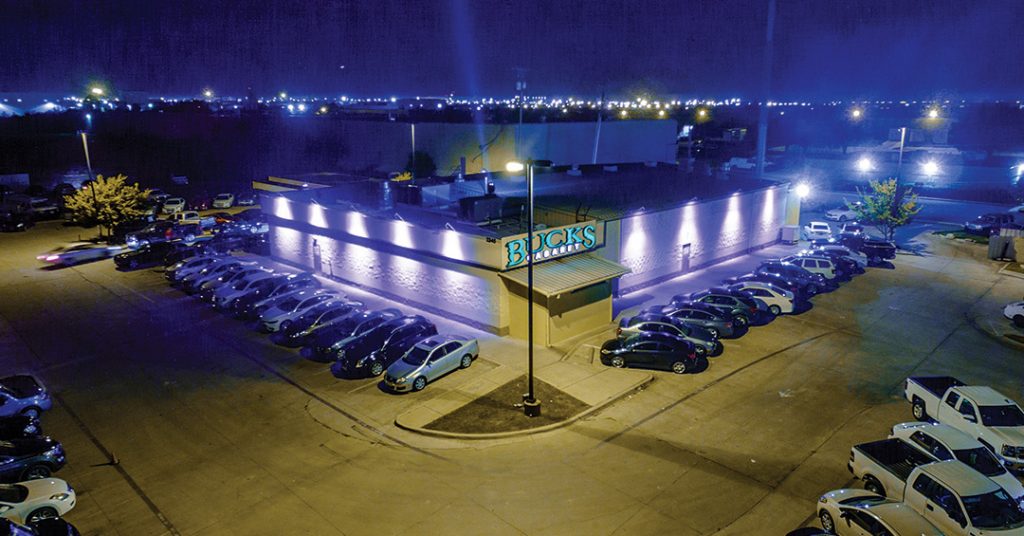After months of waiting, clubs in a number of states are now opening to varying degrees of capacity. On Thursday’s Webcon (5/21), we spoke to two club operators — Curtis Wise of the Bucks clubs, whose clubs have opened, and Brian Hopkins of On the Border in Wisconsin, whose club is set to open today (5/22) — to find out exactly how their club policies have changed, how they’re handling customers, staff and entertainers in regard to safety protocols and state laws, and more!
Wise, who had some locations at 25% and others at 50% capacity, said he was actually grateful for the reduced occupancy because it made it easier to maintain control with the dizzying array of health regulations in place.
 He felt it was a good basis moving forward and was proud of the hygienic effort he’s put forth, noting people weren’t as stringent in other public settings.
He felt it was a good basis moving forward and was proud of the hygienic effort he’s put forth, noting people weren’t as stringent in other public settings.
“It’s made me cognizant of straws on the bar, things like that that could become contaminants,” he said. “We’ve worked hard to eliminate those.”
For Hopkins, whose club is set to open today (Friday 5/22), it was all about the anticipation in the air, especially as neighboring cities in Milwaukee County were fully open.
“It’s Memorial Day (weekend), we’re normally a bit slower this weekend but that’s because people are traveling so it should be an interesting weekend,” Hopkins said, alluding to the drop in travel due to the coronavirus pandemic.
If people are traveling less, they’re settling into their masks for local use, where some municipalities have mandated masks in public.

“All employees wear masks, all of our independent, professional entertainers, we are asking them to wear a mask on the floor, the public areas,” said Wise. “When they perform on stage, we’re allowing them not to wear a mask.” He is also offering masks to customers, as is Hopkins, who said masks are suggested for staff and guests but not required.
“Whenever I’m out on the floor and I know I’m going to be within six feet of a customer or in that social bubble, I plan on wearing a mask,” said Hopkins. “I’m hoping me wearing the mask lets the staff know this is something I’m taking seriously and I suggest you do the same also.”
In addition to the masks, frequent handwashing has been a hallmark of attempts to stem the contagion’s spread.
“(Dances are) something we’re not going to stop. As far as the six-foot recommended social distancing, if it’s not a law, and it’s not actually required or ordered, we just don’t want to go there ourselves. We don’t want to be the ones that make that the way things are and have it end up being the new normal going forward. If they come in and say this can’t happen, then that’s the way it is.” – Brian Hopkins of On the Border (Wisconsin)
Wise has everyone use gloves as often as possible, including changing out between transactions. And he has everyone was their hands upon arrival and every half hour after that.
“We’re going through massive amounts of sanitizer, which I’m sure all you guys know or are discovering, because it’s like liquid gold,” said Wise. “It’s very expensive so we upped the handwashing, and it’s cut down on the use on our actual sanitizer.”
Wise knows he and the industry can’t be too careful when it comes to playing it safe.

“The one thing that’s really important for all of us, a lot of this is perception,” said Wise. “We already are always the ones that are the target so having the mask and working hard to have a good perception when authorities check us out for that first time, there might not be a second time if they come and check you out. They will be checking as you start to reopen. They will be checking.”
Both Wise and Hopkins are also instituting temperature checks with temperature-reading guns that eliminate the need for hands-on contact.
In a world where proximity is seen as increased risk, an industry built on carnal intimacy is adjusting on the fly.
“(Dances are) something we’re not going to stop,” says Hopkins. “As far as the six-foot recommended social distancing, if it’s not a law, and it’s not actually required or ordered, we just don’t want to go there ourselves. We don’t want to be the ones that make that the way things are and have it end up being the new normal going forward. If they come in and say this can’t happen, then that’s the way it is.”
“The one thing that’s really important for all of us, a lot of this is perception. We already are always the ones that are the target so having the mask and working hard to have a good perception when authorities check us out for that first time, there might not be a second time if they come and check you out. They will be checking as you start to reopen. They will be checking.” — Curtis Wise
For some of Wise’s Bucks locations, dances are relegated to secluded, upgraded areas while main areas (entrance, public floor) don’t allow dances.
While the “new normal” comes gruelingly into focus for the gentlemen’s club industry — and the world — it is clear people are ready to discover what that looks like versus imagining in isolation.
“Our average per head has definitely been up because the 25-50% (depending on capacity allowance) of the people that are coming out are the people that really want to be there,” said Wise.
A livelier scene is being painted in Wisconsin where the state’s supreme court overturned
extended stay-at-home orders resulting in Wisconsinites taking to the streets, desperate for normal.
“The phone’s been ringing off the hook — dancers looking for jobs, customers wondering if we’re open yet,” said Hopkins. “Everyone’s just waiting to get out, be able to do something, be able to do what they used to do.”
Note: There was an additional presentation during Thursday’s Webcon.
VISA and MasterCard have offered a $5.54 billion settlement of a class-action lawsuit. This settlement is for a violation of antitrust laws for setting interchange rates and limiting merchants from steering their customers to other payment methods.
YOU, as a merchant that accepted Visa and MasterCard during the eligibility period of January 1, 2004 thru January 25, 2019 (15 years) are entitled to a portion of that settlement. The amount of credit cards you processed during that period enhances your claim.
For more information:
Dan Segall, D & KS Enterprises, Inc., Marketing Consultant for CCS
727-560-7654
ONLINE FILING
https://www.chargecardsettlement.com/d-ks-enterprises-inc
Please note, there will be no ED Webcon on Tuesday, May 26 due to the Memorial Day weekend. We will resume Webcons on Thursday, May 28 at 2 pm EST/11 am PST.
This article is provided for general information purposes only and is not intended to provide either an exhaustive analysis of these matters or any specific legal advice or recommendation. Laws vary by state and municipality. Club operators and others are strongly encouraged to consult their own attorneys and accountants for specific advice on how these issues will affect their businesses and what measures to take.
For more information be sure to follow our social media pages, including Facebook and Instagram, visit ExoticDancer.com, and email ED’s Dave Manack at dave@edpublications.com.




























